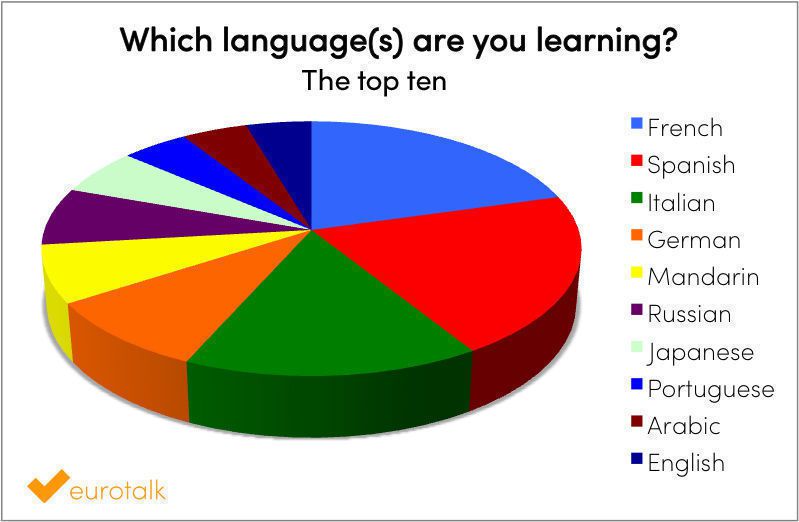Talking about Time: Insights from Other Languages
The following post is from Paul, an English teacher who lives in Argentina. Paul writes on behalf of Language Trainers, a language teaching service which offers foreign-language level tests as well as other free language-learning resources on their website. Check out their Facebook page or send an email to paul@languagetrainers.com for more information.
If you love languages, and you’d like to guest blog for EuroTalk, please get in touch; we’d love to hear from you.
Talking about Time: Insights from Other Languages
Time: it’s an essential part of our everyday life, and we talk about it constantly — yet we can’t see or touch it. In English, we usually conceptualize time as a linear distance along a horizontal plane. This seems totally natural to us: time can be long or short, deadlines can be close to us or far away from us, and we have no problem representing minutes and hours on a timeline.

Image via Pexels
But as common as these expressions are, they raise some important questions about how we express time through language. As we’ll see, we often use conflicting metaphors to describe the passage of time. And other languages express time in a completely different way, challenging this anglocentric notion of time that seems so natural to English speakers.
Does time move around us, or do we move through time?
There’s no question that our relationship to time is a dynamic one: days pass, we get older, and the future becomes the past. But who’s doing the moving: time, or us? Expressions like “time flies” or “the hour dragged on” suggest that time moves and takes us with it. Indeed, if we talk about an upcoming test — “The final exam is getting closer” — we can certainly phrase it in terms of time moving towards us.
But we can also talk about the same test by saying “We’re getting closer to the exam date”. Suddenly, the relationship is flipped: now time is static, and we’re moving through time into the future. Indeed, language enables us to conceptualize time in terms as a static entity that we move through, as well as a dynamic entity that moves around us.
In just the English language, we have already found some peculiarities about how we express time. But when we introduce other languages into the equation, the picture gets even more interesting.
Is time horizontal or vertical?
In English, regardless of whether time moves towards us or we move through time, this movement is definitely horizontal. The words we use to describe time — “push back” a deadline, “be ahead” of schedule — are the same ones we use to describe horizontal distances (e.g., “take a step back”, “walk ahead of her”). That is, for English speakers, time is horizontal, with the past behind us and the future in front of us.
But this isn’t necessarily the case in Mandarin Chinese. For Mandarin speakers, it’s possible to talk about time in the same way as English speakers, with time running along a horizontal plane. But it’s also common to use vertical terms to describe the order of events, days, semesters, etc. For instance, the words shàng (up) and xià (down) can be used to express temporal relations: xià ge yuè means “next month”, and shàng ge yuè means “last month”.
Thus, in Mandarin, our familiar horizontal timeline can be flipped vertically, with the past being up and the future being down.
Is time a distance or a quantity?
Two classic ways to express time are the timeline and the hourglass. However, these point to starkly different metaphors. Whereas a timeline suggests that time is a distance, an hourglass suggests that time is a quantity. In English, we generally prefer to talk about time as a distance — saying that something “lasts a long time” is more common than saying it “lasts a lot of time”.

Image via Pixabay
In Spanish, however, this isn’t the case. Indeed, saying tiempo largo (literally “long time”) sounds odd in most dialects; instead, mucho tiempo (“a lot of time”) is much preferred. Greek, too, features this tendency to use volume-oriented metaphors, using words like megalos (“large”) and poli (“much”).
Thus, whereas in English, our use of language favors the timeline, other languages like Spanish and Greek make greater use of the hourglass in their temporal expressions.
Is the past in front of us or behind us?
In English, we can look back into the past and forward into the future. This is as clear as day to us: the past is behind us, and the future is in front of us. Yet in spite of how obvious this may seem to us, this isn’t the case in all languages.
Take Aymara, an Amerindian language spoken in some regions of Bolivia, Peru, and Chile. In Aymara, the past is described as being in front of us, whereas the future is behind us. Though this conception of time seems jarring to us English speakers, it’s logical: we can see in front of us, just as we can remember the past; but we can’t see behind us, just as we can’t predict the future.
To our English-speaking brains, it seems only natural that time is a distance that moves horizontally. But as we’ve seen, this isn’t necessarily the case across languages: time is a complicated concept, and can be expressed through a variety of metaphors. Indeed, as any language learner knows, languages aren’t just sets of words, but rather bring with them a whole new way to view the world. That’s just one of many reasons why learning a language is such a great use of your time — whether that time be above you, below you, in front of you, or behind you.
5 reasons NOT to learn a language
Yes, you did read that correctly. We’re always telling you why learning a language is one of the best things you can do – so today, we’re examining a few of the main reasons why people choose not to do it. How many of these do you recognise?
1. I’m not good at languages
We’ve all said this at some point. What it really means is ‘I didn’t do well at languages at school, so I must be bad at them.’ (Remember that time in Spanish class when you accidentally said you were pregnant when you meant embarrassed, and everyone laughed? Nightmare.)
But we all learn differently and at school, we were only taught one way. So maybe it’s just that you haven’t found the right way for you yet…
2. I can’t afford it
Learning a language doesn’t need to cost a fortune. You could read newspapers online in the language you’re learning. Or find a friend to chat to, either in person or via Skype. If you’re a creative type, make yourself some flashcards and use them to practise your vocabulary.
For more tips, visit Alex’s article on learning a language on a budget. And check out our special offer at the end of this email…
3. I don’t need to learn a language
This is one that’s often heard among English speakers: ‘But everyone speaks English!’ (Apparently 33% of Brits think speaking English with a foreign accent is the answer. It really isn’t.)
And while it might be true that a lot of people now speak English, that doesn’t mean we should stop making the effort. By knowing just a few words like hello and thank you, we show respect and probably end up having a better experience as a result.
4. I haven’t got time
We all lead busy lives, and it can be hard to find time to do everything we want to do. But learning a language doesn’t have to mean studying for hours on end. Break it up into small, manageable tasks and fit it around your daily life – on the bus to work, for instance, or waiting for a meeting to start. You may be surprised how much time you actually have.
For more advice, check out our blog post on making time to learn a language.
5. I’m too old to learn a language
You’re never too old. It may be true that children’s brains are better suited to picking up new languages, but it doesn’t necessarily follow that adults can’t do it. Just look at Benny Lewis, who hated languages at school and now speaks seven fluently. If he can do it, why not the rest of us?
So let’s stop making excuses and start learning a language now; in a year’s time we’ll be glad we did…
7 ways to stay motivated in your language learning
So we’re now a few weeks into 2015, and chances are all the resolutions we made in a fit of great excitement on January 1st are a dim and distant memory. If one of your goals for this year is to learn a new language, here are a few tips to help you stick at it, even when real life gets in the way, and your motivation starts to fade…
Make it fun
You’re far more likely to learn if you’re enjoying yourself. Of course, the best way to pick up a language is to take a trip to the country where they speak it, but that’s not an option for most of us, particularly so soon after the expense of Christmas! So instead, get yourself an app like uTalk or pick up some Flashsticks to post up all over your house (and office, and car…). Or if you’re on a budget, make up your own game. There is no right way of learning a language, and everyone’s different – but wouldn’t you rather be having fun while you study than poring over a grammar book trying to memorise verb endings?
Make it a competition
I’m currently learning German, and know for a fact I wouldn’t be if it weren’t for the uTalk challenge. I don’t really need to learn German – I’m not going to Germany in the immediate future, nor do I have a German mother-in-law to impress – but I fancied trying something new and different. The problem with learning a language just for fun, though, is that it’s very easy to give up without a pressing reason to keep going. The uTalk challenge gave me that reason; I’m a very competitive person, and I wasn’t about to let my colleagues beat me (well, except Nat, who destroyed us all). Knowing that I had to come into work each morning and update my score on the board has kept me motivated, and as a result I now know probably several hundred new words that I didn’t know before.
Focus on the end goal
While there are many people who, like me, decide to learn a language just for the fun of it, there are many more who do it for a specific reason. So if you feel your enthusiasm starting to wane, focus not on learning the language, but on what it’ll mean when you’ve learnt it. Maybe it’s a new job, a new relationship or a forthcoming trip. If you concentrate on what you’re getting from knowing a new language, suddenly putting the time in to study won’t seem nearly such a chore.
Reward yourself regularly
Remembering your ultimate goal is important, but that can sometimes seem far, far away. If you were about to climb Everest and didn’t plan to stop till you got to the summit, you’d probably never start (and who could blame you). So make sure you set yourself achievable ‘in-between’ goals, and reward yourself appropriately when you get there. Personally, I find chocolate to be an excellent incentive. Or you could allow yourself an episode of your favourite TV show, or a shopping trip. Whatever works for you and will keep you motivated to press on.
Set aside time
Life can be incredibly busy, and often it feels like there isn’t enough time to do everything, so learning a language can slip down the to-do list behind other, more pressing tasks. To combat this argument, try setting aside a fixed amount of time each day, or a few times a week, which is only for language learning. Where that time fits into the rest of your schedule is up to you, but the important thing is that nothing else gets in the way. And if you can make use of ‘dead time’ like your daily commute, so much the better – that way you’re not using up hours that would ordinarily be used for other jobs.
Tell other people
I’m a great believer in this one. Tell friends and family that you’re learning a language, and chances are at some point, they’re going to ask you how it’s going. And if they don’t, ask them to. If I know that at any moment someone’s going to demand that I say something in another language, I’m much more likely to keep learning it, just in case. (Of course, when they do ask me to say something, my mind will instantly go blank – but that’s another story.)
Don’t give up, even if you slip up
As with any goal, there are going to be pitfalls along the way. You’d have to be incredibly determined (and slightly superhuman) to never have an off-day or consider giving up. And that’s ok, but the important thing is to pick yourself up after this wobble and keep going. Knowing you’ve overcome a few obstacles is only going to make the moment you have your first conversation in another language that much sweeter, because after all…
Good luck (or should I say Viel Glück)!
Liz
Which language are you learning? The results!
We had a great response to our recent language learning survey; thank you to everyone who took the time to complete it. First things first: we’re delighted to announce that the winner of the iPad mini prize draw is Konstantia Sakellariou. Congratulations, Konstantia – your iPad is on its way!
We wanted also to share a few of our findings with you. Some of the results from the survey were as we expected, others were quite surprising. Here are just a few of the things you had to tell us. Thanks again for all your thoughtful responses, we’ll put them to good use.
Which language(s) are you learning (or would like to learn)?
The first question was pretty straightforward. A couple of people ticked every language on offer (over 100) – now that’s what we call ambition! – but most chose between 1 and 5. Here are the top ten most popular languages:  Other popular choices included Greek, Swedish, Dutch, Brazilian Portuguese, Norwegian, Irish, Polish and Icelandic. We also got some requests for languages we don’t yet offer, like Guernésiais and Twi – we’ll do our best to add those languages to our list, so watch this space!
Other popular choices included Greek, Swedish, Dutch, Brazilian Portuguese, Norwegian, Irish, Polish and Icelandic. We also got some requests for languages we don’t yet offer, like Guernésiais and Twi – we’ll do our best to add those languages to our list, so watch this space!
Why are you learning a language?
Next, we wanted to know why you’re learning a language. Nearly half of the respondents chose travel as a reason, and almost as many said they were learning a language just for fun. 36% of respondents said it was for family reasons or for a relationship, and 27% for work. The results were quite evenly split though, showing that there’s no one overwhelming reason – everyone has their own motivation.  Among the other reasons, we had a range of answers, including an interest in the culture of the language, personal challenge and wanting to follow literature, film and music in other languages. Many people are living in another country, which was their main motivation for learning the local language. And one person said that their heart asked for the knowledge, which we loved 🙂
Among the other reasons, we had a range of answers, including an interest in the culture of the language, personal challenge and wanting to follow literature, film and music in other languages. Many people are living in another country, which was their main motivation for learning the local language. And one person said that their heart asked for the knowledge, which we loved 🙂
What prevents you from learning a language?
We were also interested to know what stops people from learning a language, so we asked you to rate the following reasons out of 5. The most common barrier to learning is a lack of time, followed by not having found the right method, and then the cost involved.  Incidentally, if you’re facing any of these barriers, you may like to check out our recent posts, on finding time to learn a language and learning on a budget. And if you’re looking for resources, did you know you can try out the EuroTalk learning method for free? Either visit our website, or download our free app, uTalk for iOS, to give it a go. We believe learning a language should be fun, because our research shows we learn much better if we’re enjoying ourselves, and this in turn makes it a lot easier to overcome the obstacles that get in the way. See what you think! Other answers included not having an opportunity to use the language, a lack of motivation and difficulty finding resources for the particular language they wanted to learn (we may be able to help there – we’ve got 136 languages and counting…).
Incidentally, if you’re facing any of these barriers, you may like to check out our recent posts, on finding time to learn a language and learning on a budget. And if you’re looking for resources, did you know you can try out the EuroTalk learning method for free? Either visit our website, or download our free app, uTalk for iOS, to give it a go. We believe learning a language should be fun, because our research shows we learn much better if we’re enjoying ourselves, and this in turn makes it a lot easier to overcome the obstacles that get in the way. See what you think! Other answers included not having an opportunity to use the language, a lack of motivation and difficulty finding resources for the particular language they wanted to learn (we may be able to help there – we’ve got 136 languages and counting…).
How have you used your language when travelling?
Finally, we asked how knowing another language has been useful when you’re travelling. There was no clear winner here, which just goes to show knowing a language is always useful! But the top response was that it gives you the ability to talk to locals in their own language; many people added that they felt more welcome as a result and that it gave them independence so they could make the most of their trip. There were lots of practical reasons too, with getting around and eating out narrowly beating shopping in the poll. If you missed out on the survey this time, don’t worry – we’re planning another one soon, so keep an eye on the blog (you can subscribe by email above to get the latest updates), or follow us on Facebook or Twitter. And if you didn’t answer this survey but would still like to have your say on any of the questions, you’re very welcome to email us or add your thoughts in the comments below.
If you missed out on the survey this time, don’t worry – we’re planning another one soon, so keep an eye on the blog (you can subscribe by email above to get the latest updates), or follow us on Facebook or Twitter. And if you didn’t answer this survey but would still like to have your say on any of the questions, you’re very welcome to email us or add your thoughts in the comments below.
Liz
Data above based on 877 survey responses.






